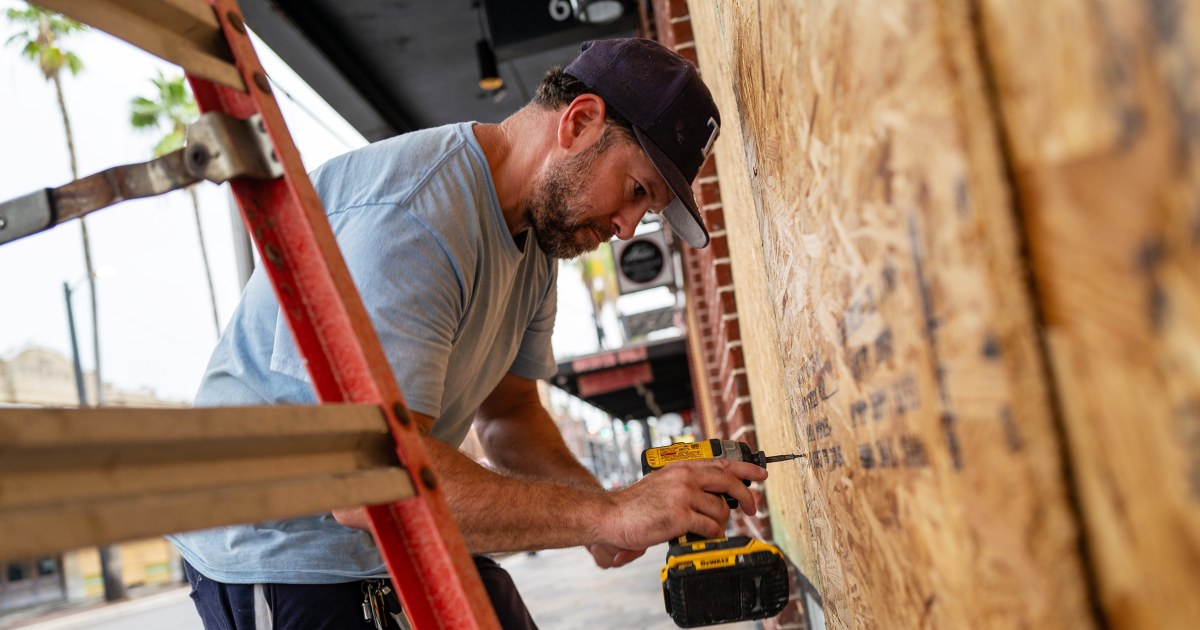Some worry that with back-to-back storms, FEMA may be stretched thin
With the second major hurricane in the past two weeks now barreling toward Florida, state and federal emergency management officials are scrambling to put personnel, equipment and supplies in place.
Officials of the Federal Emergency Management Agency — amid ongoing concern over what’s expected to be the strongest storm surge in decades — insisted it is ready for Hurricane Milton’s expected landfall late tonight or early Thursday and is fully capable of juggling concurrent disasters.
“Yes, we have the resources that we need, both for the Helene response and for Hurricane Milton,” Keith Turi, FEMA’s acting associate administrator, said this week. “I will defer to the White House on the timing of when we may need additional resources, but we want to assure everyone we have the resources we need to respond to both Helene and Milton.”
Former FEMA Administrator Craig Fugate also downplayed any fears that FEMA isn’t up for the daunting challenge it faces.
Not everyone is as confident, however.
Why Hurricane Milton’s storm surge is among its biggest threats
When Hurricane Milton reaches Florida’s Gulf Coast, forecasters warn, the immense and powerful storm could generate “life-threatening” storm surge of up to 15 feet in a region that’s particularly flood-prone.
“The Florida west coast is very sensitive to storm surge. It doesn’t take much to push water over land that would be dry,” said Cody Fritz, the Storm Surge Unit Team Lead at the National Hurricane Center. “It’s extremely vulnerable.”
Storm surge is the abnormal rise in water levels during a storm, as heavy hurricane winds push a bulge of water toward shore as depths become shallower. While winds are the primary cause of storm surge, it’s also affected by a storm’s angle of approach, the shape of the ocean floor and the low pressure within a storm, which slightly aids the bulging effect.
Because of the way storm surge can quickly inundate coastal locations and penetrate well inland, it’s typically one of the deadliest threats from a hurricane.
Part of the problem is the region’s topography. Florida’s western coastline along the Gulf of Mexico isn’t very deep, and it features a gentle underwater slope.
“The continental shelf is quite shallow,” Fritz said. “It doesn’t take a lot of force.”
Areas where more than 11 million live are under hurricane warning
Almost the entirety of Florida was under hurricane warnings or watches, or tropical storm warnings early this morning as the storm approaches.
Evacuation orders covered coastal areas at risk of being inundated by storm surge and other life-threatening effects, and officials spent yesterday telling people to leave while there was still time to get out.
But areas with populations of around 11.4 million were under hurricane warnings, according to the National Weather Service.
Areas with 1.9 million were under hurricane watches; tropical storm warnings covered 8.7 million; and a storm surge warning covered regions where 5.5 million call home, according to the agency’s website.
Bill Nye explains climate change’s role in monster Milton
Milton exploded from a Category 1 storm to a Category 5 storm in a matter of hours. The reason for the rapid intensification? Climate change.
“Science Guy” Bill Nye breaks down how climate change relates to hurricanes.
Milton forces Bucs and Lightning to leave Florida early and other teams to alter games
The NFL’s Tampa Bay Buccaneers and NHL’s Tampa Bay Lightning have left Florida ahead of Hurricane Milton to practice the rest of the week.
The Bucs departed yesterday, relocating to New Orleans, where they’ll face the Saints on Sunday. The Lightning left for Raleigh, North Carolina, on Monday night to continue preparations for their season opener against the Carolina Hurricanes on Friday night.
The Lightning’s home opener against Carolina is set for Saturday night and is on as scheduled for now.
At the college level, the American Athletic Conference announced that a football game between Memphis and South Florida at Raymond James Stadium in Tampa has been rescheduled from Friday night to Saturday. The conference plans to monitor conditions after Milton passes and adjust accordingly.
UCF’s Big 12 home football game vs. Cincinnati remains scheduled for a 3:30 p.m. EDT kickoff in Orlando.
UCF’s men’s soccer match vs. Marshall was rescheduled from Friday night to Sunday. Other college events postponed include a women’s soccer match in Boca Raton between Florida Atlantic and Rice; it was to be played Thursday and now will be played on Oct. 17.
The LPGA Tour postponed the qualifying stage of its LPGA Q-Series that was scheduled for Oct. 13-18 at Plantation Golf and Country Club in Venice, Florida. The tour said it would provide an update for the qualifying tournament after the storm passes.





